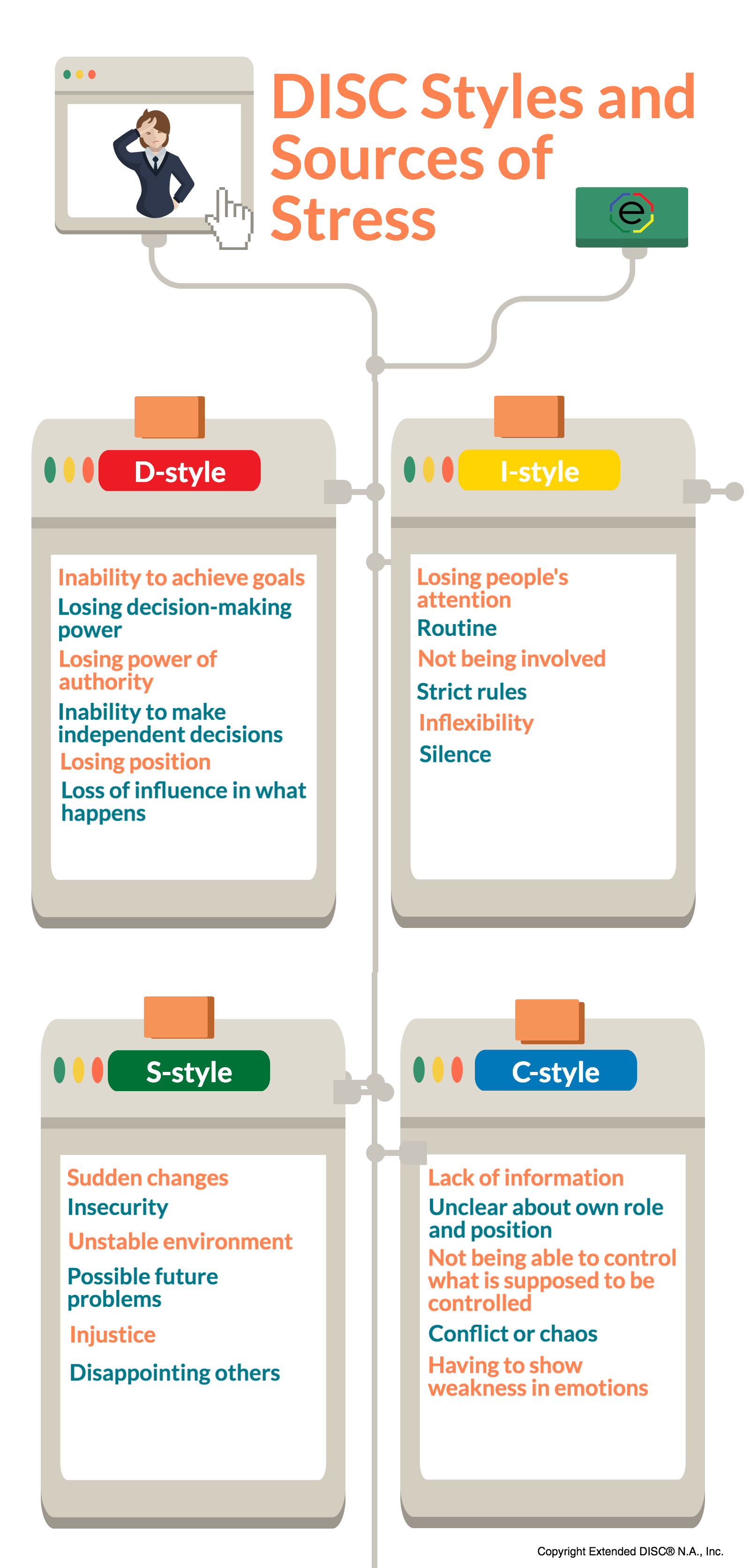How can you use DISC to manage your stress, and also help your employee’s manage stress? Managers can use DISC as a tool to identify when employees are feeling stressed; although, keep in mind, not all people exhibit stress the same way. In addition, there are also different stressors for different DISC Styles. What may be a stressor for one person may actually be a motivator and energizing for another.
How can we be more self-aware to better manage stress
Managers who are able to recognize when employees are showing signs of stress can also take the extra step to understand when to step in and how to help alleviate stress in their employees. This will help employees become more productive team members.
 Small amounts of stress can be good for us and help motivate us to achieve our goals. Yet, too much stress can impact our health, job performance, and overall happiness. We live in a fast-paced society, with many people interactions and lots of demands. While we may not feel stressed all the time, every one of us find ourselves in situations that cause us to feel stressed. When we are pressured or stressed we simply don’t have the same energy and focus to modify our styles; therefore, we become more of who we are naturally. Regardless of our style, we all feel stress at one point or another. But what causes our stress? How do we show and respond to stress? For each of us that will be different.
Small amounts of stress can be good for us and help motivate us to achieve our goals. Yet, too much stress can impact our health, job performance, and overall happiness. We live in a fast-paced society, with many people interactions and lots of demands. While we may not feel stressed all the time, every one of us find ourselves in situations that cause us to feel stressed. When we are pressured or stressed we simply don’t have the same energy and focus to modify our styles; therefore, we become more of who we are naturally. Regardless of our style, we all feel stress at one point or another. But what causes our stress? How do we show and respond to stress? For each of us that will be different.
Our hard-wired natural style determines the causes and signs of stress we experience. Everyone responds differently to situations; some situations may cause us to feel uncomfortable, pressured, and ultimately stressed. However, if we have more self-awareness of our DISC style and our stress triggers and reactions, then we are more likely able to manage ourselves when we are in stressful situations.
D-Styles and Stress Management

The cause of stress for D-styles may be situations where they do not have independence or control; for example, if their ability to make independent decisions is taken away or if they feel micromanaged. Feeling stressed begins to amplify their strengths; essentially they become more of who they are naturally. Typically a strength of the D-style is to be assertive and direct. However, when stressed they are likely to become aggressive, impatient, tunnel-visioned on a task, or insensitive.
We need to look at the causes of stress in order to help alleviate it. We know that D-styles want independence and a feeling of control; so giving them choices gives them a sense of control. If they feel like they are in charge and able to act independently, then they will feel more comfortable. Obviously, we can’t always control the situation; but oftentimes we can make small adjustments to consciously improve it.
I-Styles and Stress Management

If I-styles feel they are losing influence or sidelined, they will feel stressed. I-styles seek flexibility and variety; therefore if they feel restricted or overly-structured, it will cause them stress. When they feel pressure, they are likely to overuse the strengths of their natural style. For example, they will become overly focused on relationships or become too interested in the opinions of others. They may become disorganized or try too hard to be liked–to the point they come across as insincere.
I-styles thrive on interactions and being able to influence people. They will feel more comfortable if they are given the opportunity to interact and meet people. In addition, I-styles respond positively if they are given independence and flexibility.
S-Styles and Stress Management
 S-styles are emotional and people-focused; but they do not tend to display their emotions outwardly. When they encounter unexpected changes and unstructured situations, they may feel stressed. Although, it may not be readily apparent, unless you look for the signs. When S-styles feel pressure they can become overly cautious and try to keep the status quo. They may also become withdrawn and hidden. They may resist everything and be stubborn.
S-styles are emotional and people-focused; but they do not tend to display their emotions outwardly. When they encounter unexpected changes and unstructured situations, they may feel stressed. Although, it may not be readily apparent, unless you look for the signs. When S-styles feel pressure they can become overly cautious and try to keep the status quo. They may also become withdrawn and hidden. They may resist everything and be stubborn.
The best approach to helping S-styles alleviate stress is to pay close attention; often the signs of stress are not obvious. They seek sincerity in your guidance. They feel more comfortable in one-on-one relationships so it is best to build rapport. It’s best to provide as much information as possible so they feel the environment is more secure and stable.
C-Styles and Stress Management
 The cause of stress for C-Styles can occur when they don’t feel they have enough information or they are unclear about their roles. They prefer to avoid conflicts, chaos, and uncertainty. Signs of stress in a C-style include questioning everything, fearing the worse or becoming withdrawn and distant. They will refute anything that is not logical and refuse to move in any direction unless they feel everything is perfect.
The cause of stress for C-Styles can occur when they don’t feel they have enough information or they are unclear about their roles. They prefer to avoid conflicts, chaos, and uncertainty. Signs of stress in a C-style include questioning everything, fearing the worse or becoming withdrawn and distant. They will refute anything that is not logical and refuse to move in any direction unless they feel everything is perfect.
The best way to alleviate stress in the C-style is to provide as much information as possible and clear instructions.
Using the Extended DISC Assessment in Stress Management
 Remember, not everyone deals with stress the same way. D-Styles and I-Styles may be overt and vocal when they are stressed. However, S-Styles and C-Styles are likely to shut down or become invisible; making it difficult to recognize when they are feeling stressed. The DISC tool provides a road map to understand how we naturally prefer to do things, including how we react and how we best manage stress.
Remember, not everyone deals with stress the same way. D-Styles and I-Styles may be overt and vocal when they are stressed. However, S-Styles and C-Styles are likely to shut down or become invisible; making it difficult to recognize when they are feeling stressed. The DISC tool provides a road map to understand how we naturally prefer to do things, including how we react and how we best manage stress.
